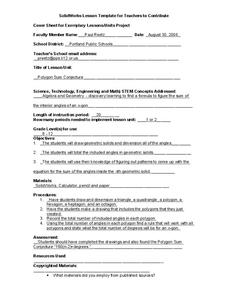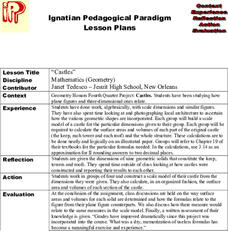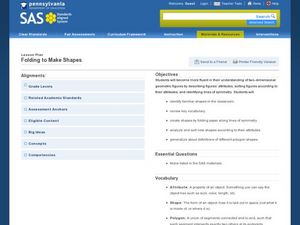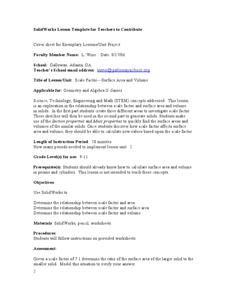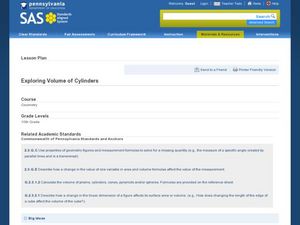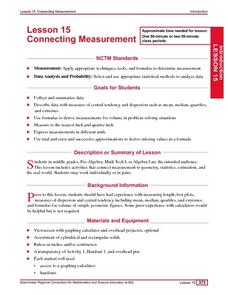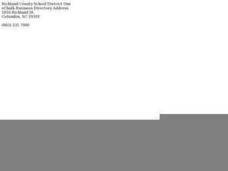Curated OER
Exploring Characteristics Needed to Prove Two Trianlges Congruent
Tenth graders explore congruent triangles. In this geometry lesson, 10th graders investigate the conditions necessary to prove two triangles congruent. The lesson combines dry erase board activities and the use of technology.
Curated OER
The Quirky Quadrilateral
Fourth graders identify and classify different triangles and quadrilaterals. Then they demonstrate an understanding of plane and solid geometric objects and use this knowledge to show relationships and solve specific problems. Students...
Curated OER
Volume of Spheres
Students find the volume of spheres. In this geometry lesson, students measure and derive the formula for each shape and solid. They use the correct terminology and units when solving these problems.
Curated OER
Polygon Sum Conjecture
Students calculate the sum of the angles of a polygon. In this geometry lesson, students use the interior angle formula of polygon based on the number of sides of the polygon. They identify the missing angle using algebra.
Curated OER
Spacemobiles
Aspiring astronauts construct a space vehicle using cylinders, cones, spheres, and rectangular prisms. This is an engaging method of learning about three-dimensional shapes. Note that the word cylinder is constantly misspelled in the...
Curated OER
Castles
Students create a scale model to a castle using the dimensions they were given. They calculate the surface areas and volumes of each section of their castle.
Curated OER
Play Dough Day
Twelfth graders build a model of the following figures with the base from column I and the cross-section from column II. Draw the base with labeled axes on the graph paper and construct the figure on top of the base with the play dough...
Curated OER
Investigating: Finding the Volume
Sixth graders explore geometry by utilizing colored cubes in class. In this volume lesson, 6th graders identify the different shapes they can create using their colored cubes and identify the formula for finding volume. Students create...
Curated OER
Folding to Make Shapes
Second graders identify different polygons and their attributes. In this geometry lesson, 2nd graders get to know polygons by studying the vocabulary and finding polygons in their classroom. They create these shapes and then find their...
Curated OER
Surface Area of Prisms
Learners calculate the surface area of different prisms. For this geometry lesson, students identify the shapes of solids based on the properties of that solid. They calculate the surface area using nets and properties of prisms.
Curated OER
More Prisms/Nets
Students calculate the volume and surface are of three-dimensional shapes. In this geometry lesson, students use the nets to prove their calculations of shapes. They identify the different parts of a solid using the nets.
Curated OER
Scale Factor- Surface Area and Volume
Students calculate the surface area and volume of shapes. In this geometry lesson, students create different scales and calculate the volume and area for each shape. They compare and contrast between the different scales and shapes.
Curated OER
Cubic Unit Models
Fourth graders find the volume of solids. In groups, 4th graders use spinners to determine the dimensions of solids. They construct the shapes, creating a model of the figure Students count the cubes in the model to determine the...
Curated OER
Captain Invincible and the Space Shapes
Students identify geometric solids. In this geometric shapes lesson, students listen to the teacher read Captain Invincible and the Space Shapes by Stuart J. Murphy. Students then visit a web site where they identify types of triangles...
Curated OER
Congruence with Robot Gobot
Students identify the properties of solids and polygons. In this geometry lesson, students identify the different measurements of a triangle. They use congruence parts and theorem to prove their answer.
Curated OER
Sketching Cylinders
Students create nets of cylinders. In this geometry lesson plan, students calculate the surface area of cylinders and other solids. They show their understanding of three-dimensional shapes by solving problems.
Curated OER
Faces, Vertices, Edges
Learners identify the parts of three dimensional objects. In this geometry lesson, students find the number of faces, edges and vertices. They differentiate between prisms and polyhedra.
Curated OER
Troublesome Towers
Young scholars observe solids and identify parts that make up the surface area. In this geometry lesson, students calculate the surface are of solids and cones. They find polygons and solids in the real world.
Curated OER
Exploring Volume of Cylinders
Tenth graders investigate the volume of a cylinder. In this geometry lesson plan, 10th graders create three-dimensional cylinders and use a ruler to determine the dimensions. The lesson plan progresses to the use of the formula to find...
Curated OER
Mirror Tool
Students define properties of polygons. In this geometry lesson, students differentiate between similar and congruent polygons. They identify and use the properties of solids to solve problems.
Curated OER
2D Polygons and 3D Nets
Young scholars compare and contrast two dimensional polygons and three dimentional nets by examining the differences in drawings. They create three dimensional shapes and label the faces, edges, and vertices. After creating the shapes,...
Curated OER
Classifying Transformations
Students analyze different polygons by shapes and sides. In this geometry lesson, students differentiate between similar and congruent polygons. They name the different polygons based on the number of sides.
Curated OER
Connecting Measurement
Students participate in activities the connect measurement to geometry, statistics, estimation, and the real world. They collect measurements from their elbow to the tip of their middle finger and make a box plot of the data as well as...
Curated OER
Surface Area of Rectagular Prisms
Sixth graders investigate the area of polygons. In this geometry lesson, 6th graders calculate area of prisms using geometric formulas. They work with prisms and other rectangular shapes.





